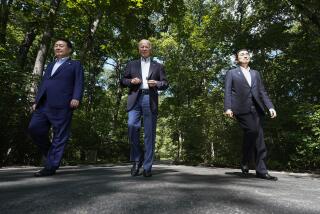Islamic leaders contemplate support for U.S. action
- Share via
DOHA, Qatar — As top representatives from the world’s largest Muslim organization gathered here Tuesday for an emergency summit, support emerged for a tentative backing of U.S. military action, as long as the endorsement is coupled with a demand for more attention to the Middle East peace process.
The U.S. military campaign against Afghanistan dramatically altered the purpose of today’s summit of the Organization of the Islamic Conference, called shortly after the Sept. 11 terrorist attacks.
Instead of formulating recommendations on how the United States should proceed in its battle against terror, the 56-member organization was wrestling Tuesday with the ongoing U.S. bombing of a fellow Muslim nation and member state.
“The line is, we support the United States. We want to be part of its coalition. We understand its agonies. We sympathize with its goals,” said Nabil Shaath, the Palestinian representative at the conference. “But we need to be consulted. It has to be done right. This is the time to build a new world that is free of the scourge of terrorism, that produces more security for people and hopefully more justice.”
Past summits, conducted sporadically to respond to urgent situations, have often been fractious affairs with few concrete achievements. For instance, Afghanistan, split between Taliban rulers and the opposition Northern Alliance, has had no voice in the organization for years because nobody could agree on who really represented the country.
But now, with bombs and missiles striking Afghanistan as delegates gather, the group’s leverage is clear, and U.S. officials concede that they are nervous about the outcome of the summit.
A condemnation of the attacks could shatter the fragile coalition backing the military campaign. Strong support would provide legitimacy to an action viewed by many in the Islamic world as an assault against their faith.
But with strong U.S. allies such as Saudi Arabia mixing with traditionally hostile governments such as Iran, neither scenario seemed likely. Instead, the dominant question is: What requirements would accompany a statement of support?
“Will they demand that certain rules should be followed, like that any attacks come under the auspices of the U.N.? Or will they demand very solid evidence? Or will they avoid the question?” asked Radwan Abdullah, a political scientist based in Jordan.
Shaath predicts that delegates will carefully balance their desire for a resolution of the Israeli-Palestinian problem with the U.S. desire for anti-terrorist action.
Washington is deeply concerned about the growing signs of opposition to its military offensive. A split among the leaders gathering here or a qualified statement that condemns terrorism but does not support military action would be a “significant blow,” an administration official said Tuesday.
The State Department has quietly launched a hearts-and-minds offensive outside Afghanistan to keep Muslim leaders on board and prevent a public backlash from undermining the international coalition against terrorism.
Secretary of State Colin Powell has talked to his counterparts in Arab and Muslim countries, as well as prominent Arab media outlets. Powell’s most significant interview was with Al-Jazeera, the television station seen as the CNN of the Islamic world.
“I hope people will see that this is a campaign of the civilized world against uncivilized forces within the world, and those uncivilized forces attacked all nations throughout the world. It is as much a cause for Arab nations and Arab leaders as it is for American leaders,” Powell told Al-Jazeera.
Some delegates here compared the current crisis to the 1991 Persian Gulf War, when shared interests between the Muslim world and the United States led to a thawing in their traditionally cold relationship.
But a U.S. failure to pay attention to the Middle East peace process would result in deeper estrangement instead of renewed closeness, said one high-ranking diplomat who asked not to be identified.
“When two sides talk past each other, during a unique period, that’s how opportunities are wasted,” the diplomat said.
More to Read
Sign up for Essential California
The most important California stories and recommendations in your inbox every morning.
You may occasionally receive promotional content from the Los Angeles Times.













